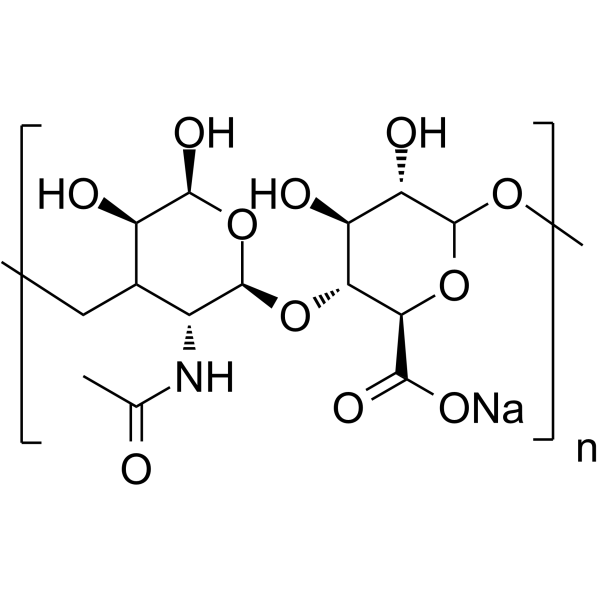天然产物 糖类和糖苷 Saccharides and Glycosides
Hyaluronic acid sodium;(Synonyms: 透明质酸钠; Sodium hyaluronate)
Hyaluronic acid sodium (Sodium hyaluronate) 是由二糖的重复单元组成的生物聚合物,应用领域广泛。

Hyaluronic acid sodium Chemical Structure
CAS No. : 9067-32-7
| 规格 | 价格 | 是否有货 | 数量 |
|---|---|---|---|
| 50 mg | ¥500 | In-stock | |
| 100 mg | ¥700 | In-stock | |
| 200 mg | ¥900 | In-stock | |
| 500 mg | ¥1500 | In-stock | |
| 1 g | ¥1900 | In-stock | |
| 5 g | ; | 询价 | ; |
| 10 g | ; | 询价 | ; |
* Please select Quantity before adding items.
Hyaluronic acid sodium 相关产品
bull;相关化合物库:
- Natural Product Library Plus
- Drug Repurposing Compound Library Plus
- FDA-Approved Drug Library Plus
- Bioactive Compound Library Plus
| 生物活性 |
Hyaluronic acid sodium (Sodium hyaluronate) is a biopolymer composed of repeating units of disaccharides with various applications. |
|---|---|
| 体外研究 (In Vitro) |
Hyaluronic acid (HA) is widely used in aesthetic medicine due to its binding ability with a large number of water molecules. It improves tissue hydration and their resistance to mechanical damage. HA plays an important role in wound healing, ovulation, fertilization, signal transduction, and tumor physiology. HA is used in joint diseases such as osteoarthritis or rheumatoid arthritis. HA of a high molecular mass reduces the chemotaxis and migration of inflammatory cells which acts as a good barrier to the inflammatory process and protects against the effects of free radicals. HA is used in ophthalmology due to its lubricating properties for the corneal endothelium, and improves tissue hydration and cellular resistance to mechanical damage in aesthetic dermatology, and has marginal adverse effects. Several trials indicate its role in tumor markers, liver diseases, and in pharmaceuticals[1]. Hyaluronan plays an important role in cancer growth and metastasis. HA and HA fragment-tumor cell interaction could activate the downstream signaling pathways, promoting cell proliferation, adhesion, migration and invasion, and inducing angiogenesis, lymphangiogenesis, epithelial-mesenchymal transition, stem cell-like property, and chemoradioresistance in digestive cancers[2]. MCE has not independently confirmed the accuracy of these methods. They are for reference only. |
| 体内研究 (In Vivo) |
The impact of applied intra-articular HA has been proven in many studies in animals. Studies on HA have shown that it promotes the synthesis of cartilage matrix, prevents its degradation, reduces inflammation, stimulates the synthesis of endogenous HA, and improves the resilience and moisture of cartilage[1]. High molecular size HA preparations, applied topically, promote healing of fresh skin wounds. They also promote the healing of venous leg ulcers and are useful in the management of chronic wounds[3]. MCE has not independently confirmed the accuracy of these methods. They are for reference only. |
| Clinical Trial |
|
| 分子量 |
1500 (kDa) |
| CAS 号 |
9067-32-7 |
| 中文名称 |
透明质酸钠;氯化钠透明质酸;玻璃酸钠;糖醛酸钠 |
| 运输条件 |
Room temperature in continental US; may vary elsewhere. |
| 储存方式 |
4deg;C, sealed storage, away from moisture *In solvent : -80deg;C, 6 months; -20deg;C, 1 month (sealed storage, away from moisture) |
| 溶解性数据 |
In Vitro:;
H2O : 3.33 mg/mL (Need ultrasonic) DMSO : < 1 mg/mL (insoluble or slightly soluble) |
| 参考文献 |
|
